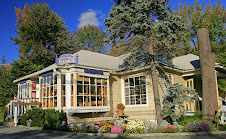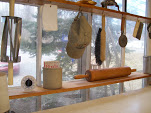…who
do we see about a day off?
(Note: This article was first published in the BBGA newsletter several years ago.)
It took a frantic amount of organization,
physical labor and nagging, lots and lots of firm, polite, incessant nagging to
get everything done. There was wiring and plumbing and drywall, there were
floors that needed reinforcing, a foundation that needed shoring up. Floor
plans had to be drawn for Labor and Industry codes that needed addressing and
inspecting, not to mention the health codes with their ensuing inspections.
There were benches, walls and shelves that needed to be built, painting,
papering, and restoration of the beautiful but crumbling mullioned windows that
made the shop what it was. Equipment was purchased and installed, most of it
used, most of it needing some kind of special attention. We spent the final
week doing basic prep work and overseeing the removal of several dead or dying
trees.
In fewer than ninety days from the time we
closed on the real estate and loan, we took down the “coming soon” sign, turned
on the lights and clicked the key in the lock to open the door of our bakeshop.
Nothing happened.
***
There I was, lying on the couch recovering
from a bit of surgery when Traci came in and announced, “The bakery is for
sale”.
We swung into action. Traci began by
refinancing our house in order to free up some cash for a down payment while I
began badgering the real estate agent into selling us the property for far less
than the original asking price.
The quaint, albeit shabby, little building
with the big windows had never been a bakery, it had been any number of different gift shops,
the last of which hadn’t been open for a decade or more. I’d spotted the place
in 1979, remarking how like a European pastry shop it appeared; we just called
it ‘the bakery’.
Taking full advantage of the seller’s foot
dragging we worked on a business plan for the bank, then took full advantage of
the bank’s foot dragging to cost out formulas.
In the cover letter of our plan we stated
that the reason for going into trade is not to do something for the community
or to educate the public, or to do for a living what one loves, it is to make
money and stay in business.
Our loan officer was impressed.
There were maddening delays with the title
insurance but we used that time to negotiate with contractors doing work on the
building.
I purchased the book “Breads from the La
Brea Bakery” and started learning about natural leaven, and made a starter. In
the back of the book was a reference to The Bread Bakers Guild of America.
Hmmm…they seemed to have the same philosophy about bread baking as we had about
cooking. We joined.
Asking the advice of people we knew, who
either were in or peripheral to the bakery business, was another ongoing
project. The first question we put to them was ‘why do so many bakeries go
bankrupt?’ Every single person had a different answer: location, products,
cleanliness, unions, ignorance; there must have been a dozen or more to go
around and around.
***
If you have ever experienced a tornado first
hand, you will know that an eerie silence precedes the actual event.
At six a.m. that first day we unlocked the
door, ready for business, with Jane (Traci’s mom) steady at the counter. Seven
o’clock came and still there were no customers. At seven-thirty someone came
in, Traci’s sister. Then someone else: the contractor who had built the front
steps. Unanimous sentiment in the shop questioned whether the area really
wanted or needed a bakery. Then someone, somewhere (not us) sent out an email.
By ten a.m. we were inundated. Two newspapers had come and gone with pictures
and interviews while patrons jammed the place. The till filled up.
It was exhilarating and fun. After all, we
were no strangers to long hours under high pressure; we’d owned a catering
service for nine years. In addition to that, Traci had worked the front of the
house for a fine country inn or two, and I’d been a chef for decades. We
unwittingly started out in the baking business with a twenty quart mixer for me
and a FIVE quart mixer for Traci. That configuration worked in all of those
fancy restaurants, didn’t it?
That first day I worked until three o’clock
in the morning and then opened again before dawn, a phenomenon that instantly
became my permanent work schedule. The first four months I worked twenty hours
a day seven days a week. Traci worked twelve hours a day, afterward going home
to take care of our three kids and the house. Then the morning arrived when I
came to, shivering uncontrollably on the stockroom floor, completely
disoriented. I vaguely remember a lot of angry customers who didn’t get their
sticky buns that morning, but it didn’t matter. I still had the best job of my
life, even without a paycheck yet.
A woman came in and told us that the loaf of
sourdough she had purchased a few days earlier was so good it actually had her
family sitting down together at dinner for the first time in months. (When you
hear things like that, remuneration almost becomes irrelevant, but not quite.)
It certainly helped to ease the workload
when Traci got the twenty quart mixer and I got an eighty quart Hobart three
weeks after opening, but other businesses were pressing us for wholesale breads
and Traci’s fabulous pies; retail customers kept multiplying even though it was
one of the snowiest winters on record. I swear they were arriving by dog sled.
Then summer hit. Hundreds of expensive homes
in nearby communities filled up for the season, nearly doubling our business.
By then we had acquired a bit of savvy and a couple of freezers, and hired on
some help. We paid ourselves one small salary, less than half of what a chef
makes in a French restaurant.
Thanksgiving was the big holiday kickoff,
with one of our helpers quitting at just the right moment. Then Christmas came
along with the guy who gave us two days’ notice for sixty extra-large baskets
filled with all manner of breads and treats, wrapped and tied with huge bows.
We closed for the first week of January.
After looking at the books we decided
wholesaling was only slightly more attractive than self-immolation; the shop
was set up to make money from retail sales. I contacted our accounts to inform
them that they would thenceforth receive a discount of fifteen percent instead
of the forty percent they had formerly enjoyed. The desired result was
immediate: one or two anteed up, but the rest were content to go back to the
mass produced stuff available everywhere, quality (or lack of it) be damned.
Our second year focused on streamlining the
workload, chopping costs and improving the quality of some of our breads and
pastries. We made significant headway on the first two challenges by setting
weekly and daily schedules and by cost-comparative purchasing.
Improving quality was a bit more eclectic,
our semolina bread being a good example. It lacked oven spring, the crust was
leathery and the flavor boring. Karen Bornarth’s article in the Bread Baker’s
Guild of America newsletter, regarding the Coupe du Monde de la Boulangerie,
mentioned using a preferment and honey in semolina bread. Coupling that with
theartisan.net’s biga formula and semolina pre-soak resulted in the finished
loaves having deeply fermented flavor and very loud crusts, looking like
flexing, oversized biceps tearing through shirt sleeves. Increased sales to
existing customers will be the next focus, partly through offering our own
par-baked frozen breads for finishing at home.
So here we go, careening head first into our
third year. We’re still barking our shins on the eighty quart bowls and
thanking God every day for it. Any regrets? Well, no, actually.














